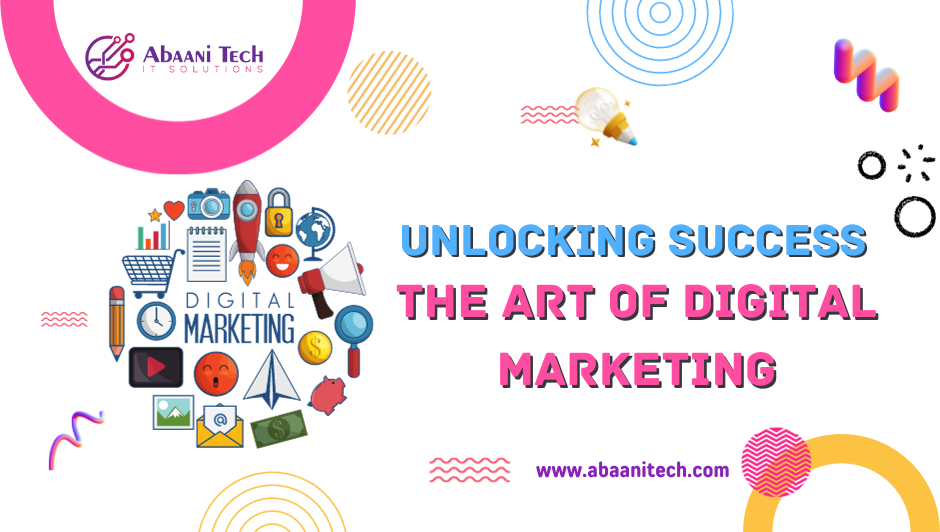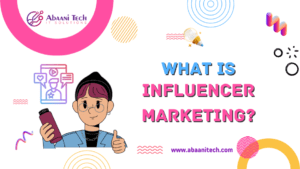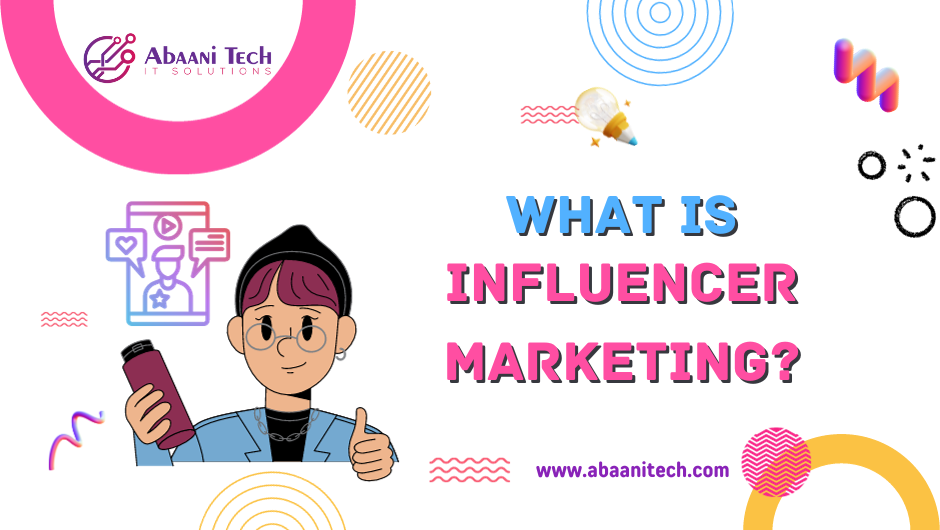Unlocking Success: The Art of Digital Marketing


Digital marketing has revolutionized the way businesses connect with their audiences. In a world driven by technology, understanding the art of digital marketing has become a pivotal factor in achieving success.
This article will delve into the intricacies of digital marketing, exploring its various components, strategies, and the role it plays in unlocking success for businesses.
- What is Digital Marketing?
- The Importance of Digital Marketing
- Key Components of Digital Marketing
- Strategies for Successful Digital Marketing
- Role of SEO in Digital Marketing
- Content Marketing: Heart of Digital Marketing
- Leveraging Social Media for Digital Success
- Email Marketing: The Power of Personalization
- The World of Paid Advertising: PPC
- Measuring and Analyzing Digital Marketing Performance
- Staying Ahead: Ever-Evolving Digital Marketing Trends
- Conclusion
- FAQs
What is Digital Marketing?
Digital marketing encompasses all marketing efforts that use an electronic device or the internet. It leverages online channels such as search engines, social media, email, and websites to connect with current and prospective customers. Unlike traditional marketing, digital marketing allows for real-time analysis and precise targeting.
The Importance of Digital Marketing
In today’s digital age, the importance of digital marketing cannot be overstated. It enables businesses to reach their target audience where they spend most of their time – online.
Digital marketing is cost-effective, highly measurable, and facilitates personalized interactions, making it an invaluable tool for any business.
Digital marketing is a vast landscape comprising various strategies and techniques. To unlock success, it’s essential to comprehend the core components that drive this field.
Key Components of Digital Marketing


Key Components of Digital Marketing encompass various strategies like SEO, content marketing, social media, email marketing, and PPC advertising, each playing a crucial role in reaching a wider online audience. Let’s discuss in detail:
1. Search Engine Optimization (SEO)
SEO is the process of optimizing a website to rank higher in search engine results pages. By using relevant keywords and improving website structure, businesses can increase their online visibility.
2. Content Marketing
Content marketing involves creating and distributing valuable, relevant, and consistent content to attract and engage a target audience. Compelling content builds trust and drives customer loyalty.
3. Social Media Marketing
Social media platforms provide businesses with the means to interact with their audience, showcase products, and build brand identity. Effective social media marketing is all about engagement and relationship building.
4. Email Marketing
Email marketing enables businesses to send personalized messages to a segmented audience. It’s an excellent tool for nurturing leads and retaining customers.
5. Pay-Per-Click Advertising (PPC)
PPC is a paid advertising model where advertisers pay a fee each time their ad is clicked. It’s a quick way to drive traffic to a website and can be highly targeted.
Strategies for Successful Digital Marketing
To unlock success in digital marketing, businesses must follow a strategic approach.
- Target Audience Analysis: Understanding your target audience is fundamental. Create buyer personas and tailor your strategies to their needs and preferences.
- Setting Clear Goals: Define specific, measurable, achievable, relevant, and time-bound (SMART) goals for your digital marketing campaigns.
- Content Creation and Distribution: Craft high-quality content and ensure it reaches your audience through various channels.
- Analytics and Data-Driven Decisions: Use data and analytics tools to measure the performance of your campaigns and make informed decisions for optimization.
Role of SEO in Digital Marketing
The role of SEO in digital marketing is to enhance online visibility, encompassing on-page and off-page strategies, local optimization, and adherence to SEO best practices for improved search engine rankings.
- On-Page SEO: On-page SEO involves optimizing individual web pages to rank higher and earn more relevant traffic.
- Off-Page SEO: Off-page SEO focuses on improving the online reputation and authority of a website through external factors.
- Local SEO: Local SEO targets local customers by optimizing your online presence for a specific geographic area.
- SEO Best Practices: Staying updated with SEO best practices is crucial for long-term success.
Content Marketing: Heart of Digital Marketing
Content marketing is the core of digital marketing, creating valuable content, distributing it strategically, and building trust, making it an indispensable component for engaging and connecting with the audience.
- Crafting Compelling Content: Creating content that resonates with your audience is the key to success in content marketing.
- Content Distribution: Promote your content through various channels, such as social media, email, and guest posts.
- Content Strategy: Develop a content strategy that aligns with your business goals and audience needs.
Leveraging Social Media for Digital Success


In the digital age, leveraging social media is a pivotal aspect of achieving success in the online realm. It involves a multifaceted approach to harness the potential of various social media platforms. Let’s discuss some digital success factors.
Social Media Platforms
First and foremost, identifying the most relevant social media platforms for your business is essential. Not all platforms are created equal, and your target audience may be more active on some than others. By understanding where your audience spends their online time, you can tailor your efforts effectively and maximize your impact.
Building a Social Media Presence
Maintaining an active presence on these chosen platforms is crucial. Consistency is key in social media, as it keeps your brand in the spotlight and ensures that your audience remains engaged with your content.
Social media advertising
Social media advertising is another powerful tool at your disposal. It allows you to expand your reach and target specific demographics with precision. Paid advertising options on social media platforms enable you to create highly targeted campaigns, maximizing your return on investment.
Building a robust social media presence goes beyond posting content. It involves engaging with your followers, responding to comments, and fostering a strong online community. This not only helps in building brand loyalty but also encourages meaningful interactions, which can translate into increased brand advocacy and, ultimately, digital success.
Email Marketing: The Power of Personalization
Email marketing power lies in personalization, allowing businesses to send tailored messages that resonate with individual recipients, fostering stronger connections.
- Building an Email List: Grow your email list by offering incentives and providing valuable content.
- Email Campaigns: Create targeted email campaigns that deliver relevant content to specific segments of your audience.
- Email Automation: Utilize automation tools to streamline your email marketing efforts.
The World of Paid Advertising: PPC
Paid advertising, particularly Pay-Per-Click (PPC), provides a swift route to driving targeted traffic and achieving specific marketing goals.
- Understanding Pay-Per-Click: Understand the intricacies of PPC advertising and how it can benefit your business.
- Google Ads: Explore Google Ads as a powerful PPC platform to drive traffic and conversions.
- Measuring PPC Success: Track and analyze your PPC campaigns to ensure a positive return on investment.
Measuring and Analyzing Digital Marketing Performance
Measuring and analyzing digital marketing performance is essential for understanding what works, optimizing strategies, and achieving desired outcomes.
- Key Metrics and KPIs: Identify the key metrics and key performance indicators that matter most to your business.
- Tools for Analytics: Leverage various analytics tools and platforms to gain insights into your digital marketing efforts.
- Making Data-Driven Decisions: Use data to make informed decisions and continually optimize your digital marketing strategies.
Staying Ahead: Ever-Evolving Digital Marketing Trends
Digital marketing is constantly evolving. Stay ahead by embracing emerging trends:
- Voice Search: Optimize your content for voice search to accommodate the growing use of voice-activated devices.
- Video Marketing: Utilize the power of video content to engage your audience.
- Artificial Intelligence: Explore AI-driven tools to enhance personalization and automation.
- Social Commerce: Leverage social media platforms for direct sales and e-commerce.
Conclusion
Digital marketing is an art that combines strategy, creativity, and data-driven decisions. Unlocking success in the digital landscape requires a comprehensive understanding of its components and a commitment to continuous improvement. Embrace the ever-evolving trends, measure your performance, and stay ahead in the game to achieve remarkable results.
Read our informative article: SEM: Boosting Your Online Visibility
FAQs
- What is the primary goal of digital marketing?
The primary goal of digital marketing is to connect with and engage a target audience through online channels to achieve specific business objectives, such as increasing brand awareness, driving website traffic, generating leads, or making sales.
- How can businesses measure the success of their digital marketing campaigns?
Businesses can measure the success of their digital marketing campaigns by using key metrics and key performance indicators (KPIs), such as website traffic, conversion rates, click-through rates, and return on investment (ROI).
- What are some emerging trends in digital marketing?
Emerging trends in digital marketing include voice search optimization, video marketing, the use of artificial intelligence, and social commerce through social media platforms.
- Why is content marketing considered the heart of digital marketing?
Content marketing is considered the heart of digital marketing because it involves creating valuable and engaging content that forms the foundation of successful digital marketing campaigns. It builds trust, educates, and engages the target audience.
- How can businesses utilize data-driven decisions in their digital marketing strategies?
Businesses can utilize data-driven decisions in their digital marketing strategies by using analytics tools to collect and analyze data, enabling them to make informed choices, optimize campaigns, and achieve better results.





